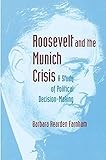Roosevelt and the Munich Crisis : A Study of Political Decision-Making / Barbara Reardon Farnham.
Material type: TextSeries: Princeton Studies in International History and Politics ; 190Publisher: Princeton, NJ : Princeton University Press, [2022]Copyright date: ©1997Description: 1 online resource (328 p.)Content type:
TextSeries: Princeton Studies in International History and Politics ; 190Publisher: Princeton, NJ : Princeton University Press, [2022]Copyright date: ©1997Description: 1 online resource (328 p.)Content type: - 9780691227511
- HISTORY / United States / 20th Century
- Acceptability
- Aid to democracies
- Airpower
- Appeasement
- Authoritarian government
- Behavioral Decision Theory
- Belief systems
- Berchtesgaden
- Blockade
- Bolstering
- Buck-passing
- Bureaucratic politics
- Case studies
- Charlottesville Program
- Cognitive effort
- Compromise
- Consensus
- Consistency
- Czechoslovakia
- Decision rules
- Democratic peace
- Diesing, Paul
- Dror, Yehezkel
- Emerson, William
- Europe
- France
- George, Alexander
- Godesberg meeting
- Good Neighbor Policy
- Haglund, David
- Helium controversy
- Hull, Cordell
- Hyde Park meetings
- Incrementalism
- Interventionists
- Isolationism
- Jouaux, Leon
- Keynes, John Maynard
- Levels of analysis
- Lindsay, Sir Ronald
- Lothian, Lord
- Nine Power Conference
- Opportunity costs
- Optimizing
- Plausibility probe
- Policy analysts
- Rainbow Plans
- Rearmament
- Roosevelt administration
- Search-design continuum
- neutrality
- 940.532273 23
- E183.8.G3
- E183.8.G3 .F376 1997
- online - DeGruyter
| Item type | Current library | Call number | URL | Status | Notes | Barcode | |
|---|---|---|---|---|---|---|---|
 eBook
eBook
|
Biblioteca "Angelicum" Pont. Univ. S.Tommaso d'Aquino Nuvola online | online - DeGruyter (Browse shelf(Opens below)) | Online access | Not for loan (Accesso limitato) | Accesso per gli utenti autorizzati / Access for authorized users | (dgr)9780691227511 |
Frontmatter -- Contents -- Preface -- Abbreviations Used in the Footnotes -- Chapter I Roosevelt, the Munich Crisis, and Political Decision-Making -- Part One THEORY -- Chapter II The Political Approach to Decision-Making -- PART TWO: ROOSEVELT AND THE MUNICH CRISIS -- Chapter III The "Watershed" between Two Wars: 1936-1938 -- Chapter IV The Munich Crisis -- Chapter V Assessing the Munich Crisis -- Chapter VI Dealing with the Consequences of Munich -- Chapter VII Implications for History and Theory -- Appendix A Traditional Approaches to Decision-Making -- Appendix B Analyzing the Calculus of Political Feasibility: The Nature of the Acceptability Constraint -- Appendix C The Traditional Political Strategies -- Bibliography -- Index
restricted access online access with authorization star
http://purl.org/coar/access_right/c_16ec
Franklin Roosevelt's intentions during the three years between Munich and Pearl Harbor have been a source of controversy among historians for decades. Barbara Farnham offers both a theory of how the domestic political context affects foreign policy decisions in general and a fresh interpretation of FDR's post-Munich policies based on the insights that the theory provides. Between 1936 and 1938, Roosevelt searched for ways to influence the deteriorating international situation. When Hitler's behavior during the Munich crisis showed him to be incorrigibly aggressive, FDR settled on aiding the democracies, a course to which he adhered until America's entry into the war. This policy attracted him because it allowed him to deal with a serious problem: the conflict between the need to stop Hitler and the domestic imperative to avoid any risk of American involvement in a war. Because existing theoretical approaches to value conflict ignore the influence of political factors on decision-making, they offer little help in explaining Roosevelt's behavior. As an alternative, this book develops a political approach to decision-making which focuses on the impact that awareness of the imperatives of the political context can have on decision-making processes and, through them, policy outcomes. It suggests that in the face of a clash of central values decision-makers who are aware of the demands of the political context are likely to be reluctant to make trade-offs, seeking instead a solution that gives some measure of satisfaction to all the values implicated in the decision.
Mode of access: Internet via World Wide Web.
In English.
Description based on online resource; title from PDF title page (publisher's Web site, viewed 29. Jul 2022)


